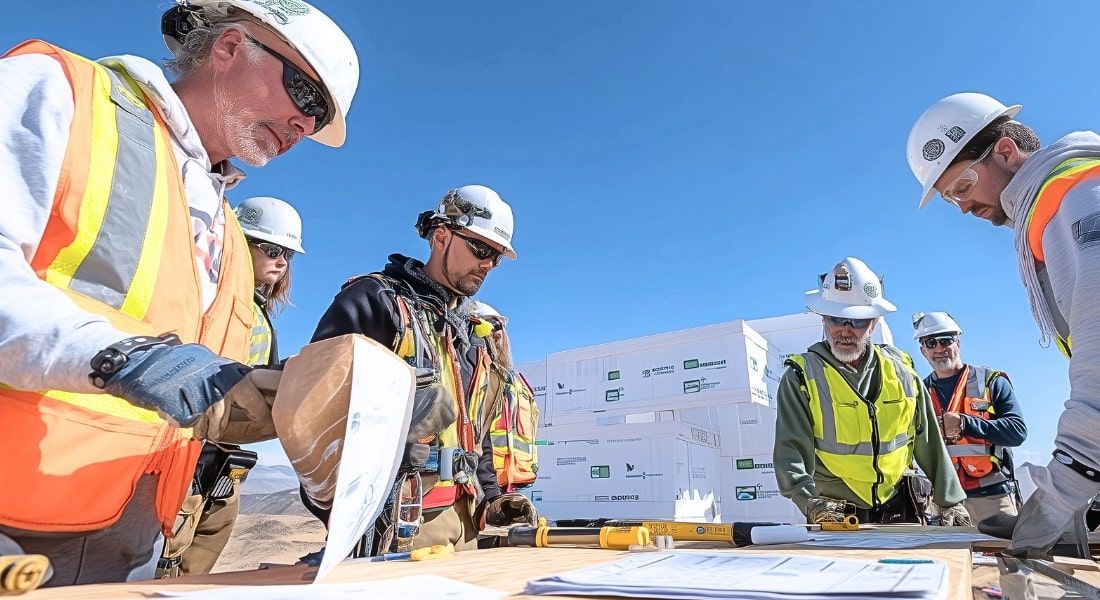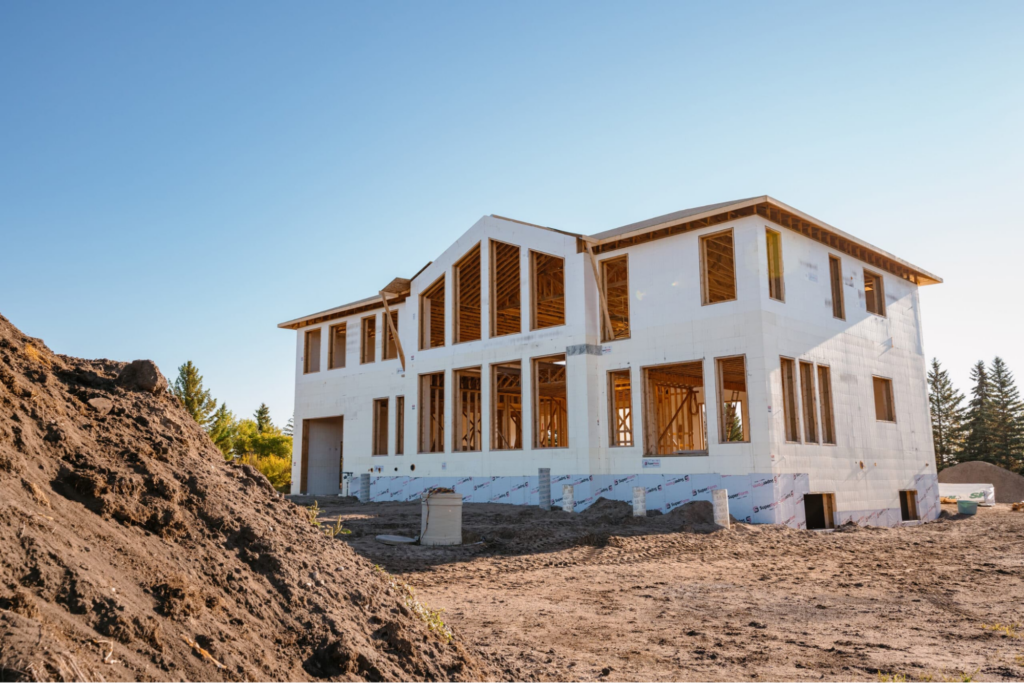The Science Behind ICF Insulation Solutions
ICFs have a reputation for offering superior energy efficiency and enhanced structural integrity. They are at the forefront of green building and disaster-resistant construction. While concrete is a significant contributor to strength, ICF insulation solutions are the key to efficiency. When it comes to ICF materials, expanded polystyrene (EPS) is one of the top choices. This insulation material offers incredible efficiency and is suitable for a wide range of applications.
This post explores the use of EPS in ICF systems and why it is a good choice. Additionally, we will also examine our EPS+ and MAX+ insulations more closely.
Exploring ICF Insulation Solutions
In basic terms, expanded polystyrene insulation is a rigid foam insulation. The manufacturing process involves taking EPS beads and using steam to activate a blowing agent, which causes the beads to expand. Because of this, the result is a closed-cell structure filled with millions of tiny, trapped air pockets. This composition is key to its effectiveness as insulation. Air is also a poor conductor of heat. All the small air pockets inhibit heat transmission through the EPS material.
One of EPS’s biggest advantages is its lightweight nature. It’s easy to handle, transport, and install, which can reduce transportation and labor costs. However, despite its low weight, EPS is surprisingly strong. Its reliable compressive strength makes it an ideal material for formwork in ICF systems.
Meanwhile, EPS foam is also moisture-resistant and chemically stable. That means you won’t have as many problems with degradation or deterioration over time. With a material that holds up well, ICFs that use EPS provide better long-term thermal performance.
EPS Foam and The Basics of Heat Transfer
Heat transfers in three basic ways: radiation, conduction, and convection. Radiation is heat energy moving in waves, similar to sunlight heating a surface. Conduction is the transfer of heat through a solid material, such as a frying pan. Convection involves heat moving through fluids, like air or water. To guard against heat transfer, you must mitigate these effects.
EPS foam effectively stops or inhibits these forms of heat transfer. Polystyrene is a poor conductor, so heat does not move through the material easily. The closed-cell structure also performs well against both conduction and convection. It prevents warm air from moving through the insulation and reaching the building. These features make EPS extremely effective for use as insulation.
Some high-performance products go one step further by using additives to reflect radiant heat. For example, some manufacturers might add graphite. That reflects the radiant heat as it passes through the material to increase efficiency. It creates an expanded polystyrene material known as GPS.
The Basics of R-Values
Understanding R-Values is another important point in recognizing the effectiveness of an insulating material. R-Values measure how well a material resists heat transfer. The higher the R-value, the better the material insulates. It’s typically expressed per inch of thickness and depends on factors like material type and density.
EPS foam has higher values than most competing insulation products. However, it isn’t just the high performance of EPS material that makes ICFs more efficient. The continuous layers of insulation make for a more efficient wall assembly.
Furthermore, In traditional wall assemblies, studs and other building elements often interrupt insulation. These breaks in the insulation create thermal bridges, which reduce the wall’s overall insulating performance. In contrast, the two continuous layers of EPS eliminate thermal bridges. Better insulative material and a more secure wall assembly increase R-values.
Enhanced By Concrete’s Thermal Mass
The EPS foam in ICF systems can also work with the concrete’s thermal mass to increase efficiency. Thermal mass refers to a material’s ability to absorb, store, and slowly release heat. Concrete does this exceptionally well.
This effect helps moderate indoor temperatures, reducing peaks and valleys that can make a space uncomfortable. By stabilizing interior conditions, thermal mass reduces the load on HVAC systems, thereby increasing occupant comfort and saving energy.
Combining the insulative properties of EPS and concrete’s thermal mass produces a high-performance wall system.
Meet SuperForm EPS+ and MAX+
When it comes to ICF insulation solutions, SuperForm offers two of the top options. Our EPS+ and MAX+ insulations offer some of the best performance in the industry.
EPS+ is a high-grade EPS insulation with the standard closed-cell structure. For example, a 1-inch-thick EPS+ 10 panel has a density of 1 lb/ft³ and a compressive strength of 10 psi. It has an R-value of 3.75 at 75°. We also offer increasing densities for a compressive strength of up to 60 psi and an R-value of up to 4.3. These figures are for 1-inch thickness at 75°.
Our MAX+ insulation takes things a step further. This product is a Neopor® graphite polystyrene. It incorporates graphite in the resin to reflect heat radiation, making it a more effective insulation product. Those reflective properties give MAX+ higher R-values. It is also available in densities, offering compressive strengths ranging from 10 to 30 psi with sheets of 1 1/16-inch thickness.
Both products are durable, moisture-resistant, and have long lifespans. EPS+ and MAX+ also have limited environmental impact, and neither use ozone-depleting HFCs.
The Benefits of ICF Insulation Solutions for Building Owners
Choosing ICF construction with EPS or GPS foam insulation offers several benefits to building owners. These systems create highly efficient, comfortable, low-maintenance structures that perform well over their lifespan. They are also suitable and beneficial for residential, commercial, and industrial structures. The following are some of the key benefits of ICF insulation for building owners:
- Energy Efficiency: ICF walls provide continuous insulation with no thermal bridging. The high R-values of EPS+ and MAX+ panels help maintain interior temperatures with minimal reliance on mechanical systems. Beyond being environmentally conscious, ICF systems are a good choice for achieving green building certifications.
- Enhanced Comfort: Thanks to their thermal mass and airtight construction, ICF systems help eliminate cold spots, drafts, and temperature swings. The combination of EPS insulation and concrete creates a stable indoor environment throughout the year. Indoor temperatures remain more consistent, improving comfort for occupants.
- Durability: EPS and GPS are incredibly durable, resisting moisture, rot, and pests, protecting the structural integrity of the building envelope. The concrete core adds strength and resilience. ICF walls can withstand wind, impact, and natural disasters. Together, these elements result in walls that require minimal maintenance over the long term.
- Indoor Air Quality: Airtight ICF walls minimize dust, allergens, and outdoor pollutants. EPS and GPS do not off-gas harmful chemicals and are free from ozone-depleting substances. That contributes to healthier indoor environments and supports better respiratory health for occupants.
- Long-Term Savings: Many building owners choose ICF construction for long-term savings. With a more efficient building envelope, you consume less energy on heating and cooling. That translates to lower utility bills, resulting in significant savings over the building’s lifetime. Additionally, the durability and longevity of ICF structures result in lower maintenance and repair costs.
- Quieter Interiors: ICFs perform exceptionally well at reducing exterior noise intrusion. Furthermore, the dense concrete core and foam layers effectively dampen noise transmission, creating a peaceful interior environment. With inherent soundproofing, ICFs can be ideal for homes, offices, and various types of businesses.
Are you interested in building with SuperForm ICF systems? From our concrete forms to different insulation types, we offer a range of construction solutions. Reach out now to learn more about SuperForm ICF and how it can take your building projects to the next level.




-min.jpg)
